- Home
- Bette Lee Crosby
The Twelfth Child Page 2
The Twelfth Child Read online
Page 2
Married to Hester Louise Dooley—March 1842
Sired three sons:
William John Lannigan—born August 1856
Joseph John Lannigan—born September 1857—died August 1883
Samuel John Lannigan—born July 1859—died October 1883
This was the Lannigan family bible. Why Livonia wondered, would William feel the need to lock it away? For a moment she was saddened by the thought that both of his brothers had died in the prime of their life. Neither of her babies would ever even know them. Why, Livonia herself was not yet born the year they died. She thanked the Lord God Almighty that her William had been spared then she moved on to the next page.
William John Lannigan—June 1876 married Bertha Abernathy, mother of,
Margaret Louise—born April 1877
Two girl babies—born March 1878—one dead at birth
Two more girl babies—born June 1879
William Matthew—born August 1880, died Christmas Eve 1883
A girl baby—born September 1881
Bertha Abernathy Lannigan died in childbirth—September 1881
Livonia could hardly believe what she read. William had said nothing about this marriage, nor had he ever spoken a word about these children. Girl Babies. Not even a name for most of them. Where were they now? What happened after their mother died? Livonia’s hands trembled as she turned to the next page.
William John Lannigan—July 1882 married second wife Lucy Maude Perkins,
William Matthew—born November 1884, died February 1885
William Matthew? Livonia flipped back to the previous page and traced her finger along the line marked William Matthew. The first boy was dead; now here, a year later, William gave the second boy the exact same name. Good Lord, she thought, how he must have been hurting. She turned back to where she had left off.
Lucy Clare—born January 1886
Girl baby—born July 1888
Lucy Maude Lannigan died January 1, 1900
Livonia heard one of her babies whimpering and she went to pick it up. How could this be, she asked herself. So many children, so few of them named. Where could they have gone to? She had lived in this house for the past three years and not once seen a trace of these children, no pictures or story books, no packed away baby clothes. Nothing. Then Livonia remembered how William had gone up into the hay loft and returned with a good sized cradle, a cradle made from the wood of apple trees that had grown right here on the Lannigan farm. She knew that for a fact, because William had told her so. Her own baby girl was sleeping quietly at the lower end of the cradle, where Ruby’s gift was tucked under the quilted pad; it was the baby boy who was fussing. She picked the baby up and held him in her arms as she returned to the open page of the Lannigan Family Bible.
Livonia sat down and counted up the children William had fathered, nine before he married her. Seven girls and two boys. She turned to the next page where there was only a sparse bit of writing at the very top of the page.
William John Lannigan—May 1903 married third wife Bessie Thurston
Bessie died childless August 1909
The remainder of the page was blank. Livonia’s name was at the top of the following page.
William John Lannigan—April 1910 married fourth wife, Livonia Goodwin,
A baby boy—born August 1911, died at birth
William Matthew—born August 1912
A girl baby—born August 1912
Livonia tearfully turned her eyes away from the book. It angered her to have her boy child named after those other sons, babies that were no more. He was not a substitute child; he was a special gift from God—a strong and healthy boy. A child who would live to till the land as William did. Livonia knew she could do nothing about young William’s name, but her precious girl deserved to have a name alongside that of the boy. A name written onto this page of their father’s family bible, a girl’s name penned in blue ink as was the boy’s. Livonia picked up William’s pen and dipped it into the inkwell. She scratched a line through the words ‘girl baby’ and wrote Abigail Anne, the name of her own mother. She would allow that the boy be named William Matthew; but the girl would be known as Abigail Anne Lannigan.
Livonia closed the bible and replaced the key on top of the ledge. As she moved William Matthew to her breast, she thought back on Ruby’s words, “The baby girl will walk a rocky road.” No, Livonia vowed, as long as there is breath in my body, no harm will come to either of my precious babies.
William Matthew, she whispered, and sweet Abigail Anne.
Livonia Lannigan remained true to her vow and as the years passed she learned how to cast each of her eyes in a different direction; one always focused on Abigail as the other watched young Will trailing along behind his father. When the boy was barely three, she’d hear William saying, “You watch this, boy. You got to know how to fix a tractor. You listening up, Will?” Of course, the boy wasn’t listening, Livonia could see that. Any fool ought to know a three year old boy just wants to romp and play. Other fools maybe, not William. He’d swing little Will up onto the back of the quarter-horse and never once take notice of how scared the boy was. Will had the thickset bones of his father, but a real timidness when it came to horses. Many a time Livonia heard the poor child crying to get off, but William was so fixed in his ways he’d keep right on circling that horse around and around the pen. “You got to learn to ride, boy,” he’d say. “What kind of farmer are you gonna be if you don’t know how to handle a horse?”
Abigail Anne was the one he should have been teaching, she was always hanging after her papa, trudging along behind him like a stray puppy. That child would have done handsprings if she thought she’d get a sliver of attention. Will would be begging to get down off the horse’s back and there she’d be, standing at the gate with those tiny little arms stretched out, “Me, Papa, me,” she’d say, but she got less notice than a gnat buzzing by her daddy’s ear.
“Abigail Anne is every bit as capable as Will,” Livonia told William time and again— but he’d generally turn off with some sort of sneer or pretend he hadn’t heard a word of what she’d said. When he tired of hearing about how Abigail Anne could keep up with whatever her brother did, William would remind Livonia that running a farm was, and always would be, men’s work.
“Cooking the supper and seeing to a man’s needs, that’s woman’s work!” he’d say and usually it was the end of the discussion.
The more William ignored her, the more determined Abigail Anne became. Livonia saw this in the child, so she fussed and badgered until the girl was allowed to ride the gentlest of the horses, Whisper. By the time Abigail Anne was six years old she could ride as well as boys twice her age, even bareback. Little as she was, she’d take hold of the mane and dig those heels into the mare’s side hollering “giddyap, giddyap.” Of course by then, Whisper was well into years and the most the poor horse could do was a sluggish trot. “Let me ride Malvania,” she’d say. “Please, Papa, please!” Of course, he wasn’t about to; especially when Will had not yet sat astride that gelding’s back.
“He’s no horse for a girl!” William would answer.
“But I can do it Papa, I can, I can!”
William wouldn’t even hear of it. “Stop pestering me, girl!” he’d say. “Get in the house and help your mama like girls are supposed to do. The Good Lord didn’t see fit to make you a boy, and I swear, by Jesus, you ain’t gonna act like one!”
“But, Papa …” Abigail would whine and stand rooted in the spot as he turned his broad back and walked off. No matter how many times William turned away, Abigail didn’t give up; she followed after him, pestering him first about one thing and then another. “I can fix the tractor,” she’d say. “I know how to do it. I can tend cows too!”
When Livonia saw this happening, she would come to Abigail Anne’s side and lead her off to some other interest—a new path that needed exploring, a new flower that needed planting, stories of women who, bold as brass, marched in
to Washington, DC and pestered congress to give them the right to vote. “Same as men!” Livonia would say, and a big smile would stretch across Abigail’s face. The child’s favorite was always stories of the fair-haired girl who lived in the glass snowball. When Livonia shook the ball, a flurry of flakes went flying, and as the snow drifted down she told tales of the girl’s life—enchanting stories of friends and parties and far-flung adventures. But once the story ended and the snow settled, Abigail would be saddened because the little girl was still sitting there with her dog alongside a big Christmas tree.
“Why can’t we see the parties?” she’d ask.
“Because they happen in our imagination,” Livonia would answer. “Magic happens inside our heads, people can’t see magic.”
Abigail Anne Lannigan
Seventy Years Later
The first time I laid eyes on Destiny was back in 1994, when she rented the old Meyerson place—it sat cattycorner from mine. By then, the house had been empty for four, maybe five years; the windows were near black and the grass so tall that from June ‘till late October the front yard had the look of a wheat field. It broke my heart to see the place in such a state— especially when I’d think back on dear Margaret Meyerson and the hours she spent squatted down by that flowerbed. She truly did love those flowers. The summer before she died, I caught sight of her picking aphids off the geraniums and shaking her head as if those little bitty bugs were the most worrisome thing she’d ever laid eyes on. Anyway, I’d begun to believe that poor house was on its way to ruin; then one morning I looked across and there was Destiny. She was perched on a wobbly kitchen stool, her yellow ponytail swishing back and forth as she scrubbed at those windows. I watched her for a good long while—watched as she’d wipe and shine one window then move on to the next. Dirty as those windows were, you’ve have figured it to be a full day’s work, but when she finished the windows, she started in on the yard. She hauled out the old lawnmower Ben Meyerson kept in the shed and took to muscling her way through a tangle of knee-high grass. I must say, it was good to hear that lawnmower again, it brought to mind the way Ben took care of the place. His lawn wasn’t much bigger than a picnic blanket, but twice a week he’d haul out that lawnmower and set to work. You knew without looking that it was him, ‘cause he’d be whistling some out-of-tune song you couldn’t quite recognize. Back when Ben lived there, I’d find my morning paper carried right to the doorstep and slipped inside the screen. Every time I mentioned something about how nice that was, a grin would slide across Ben’s face but he never did take credit for doing it. After he went to live with his daughter in Schenectady, I’d find my paper over behind the bushes or at the far end of the drive.
Destiny lived in the Meyerson place for a good two months before we actually spoke in any sizeable measure. Oh, she was neighborly enough, toot the horn and wave as she drove by in that little red Pinto—it had the look of a piecework quilt, one green fender and a patch of blue tape on the side window— but once she rounded the corner, she was gone for the day. She left early in the morning and didn’t get back ‘till after dark. Whenever she was home she’d be working on the house. With the windows wide open and no curtains or shades, you could see her plain as day—scurrying up and down the ladder, painting and polishing. I’d heard tell she actually had a full time job in the bookstore downtown but that didn’t stop her from scrubbing and cleaning the way she did. I certainly had to admire the girl’s industriousness.
One Saturday morning in the early part of October, I went out to fetch my Middleboro Tribune and it was nowhere to be found. I’d gotten somewhat used to it being behind the wisteria, but this time it wasn’t there. And, it wasn’t up under the porch, where it had also landed on a number of previous occasions—those delivery boys could be fairly irresponsible at times. I started thinking maybe it hadn’t come yet and was about to quit looking when I spotted the Cooper’s paper on the far edge of their drive. It stood to reason that if their Tribune had been delivered, mine had also; so I kept searching, poking and prodding my way through every bush along the walkway. Finally, I spotted the darn thing hanging off the edge of the roof; the plastic wrap was snagged in the gutter and it was dangling there like it was right ready to drop. So, I got hold of a broom and took four or five jabs at it, but it wouldn’t budge. By then, I was pretty well winded and about ready to give up, but Destiny came trotting over with that wobbly stool hooked under her arm. “I’ll get your newspaper, Missus Lannigan,” she called out.
That’s me, Abigail Anne Lannigan.
I’d seen Destiny scamper on and off that stool fifty times or more, but this time she reached a bit too far and over the stool went. It toppled sideways and when I tried to catch hold of it so she wouldn’t fall, we both ended up on the ground, flat on our back, with that blasted newspaper still stuck to the roof.
“Oh! I’m so sorry, Missus Lannigan,” she sputtered. Before I could explain to her that it was all my fault, she was back on her feet and tugging at my arm. “Can you get up?” she asked. “Here, let me help you. You hurt?”
“Don’t worry about me,” I answered, “I’m fine.” Truth be known, my knee was hurting, but that was because of my arthritis. I hadn’t taken much of a fall; whereas Destiny had gone heels over head. She had a good size scrape and a sizeable welt rising up on her shinbone. I’d seen enough bumps and bruises in my day to know that ought to have ice on it, so I said, “Come inside and I’ll patch you up.” She was so pleased; you’d think offering to put a chunk of ice on her leg was the kindest thing in the world. I looked at her great big smile and right off noticed what a pretty little thing she was; velvety green eyes, not bright like an emerald, not yellowy either, just a misty color that was so soft you’d wonder if there wasn’t a touch of gray mixed in. Elliott can claim I don’t have a speck of sense in my head, but I’m telling you, God Almighty would have trusted this girl if he’d caught sight of those eyes.
Once we were inside the house, I couldn’t for the life of me remember where I’d put the ice pack; but things like that didn’t bother Destiny. She took an ice cube and slid it up and down her shinbone. “See,” she said, “this works just fine.”
That morning it was a bit on the cool side so I fixed us a pot of tea and, busy as she was, Destiny sat there talking to me for well over an hour. I said, “You must have better things to do than spend time with a clumsy old lady,” but she smiled like she was having a real nice time and poured herself another cup of tea. She was a talker, Destiny, and when she got to telling a story, you’d lean in close to soak up every word that came out of her mouth. The sound of her voice was so sweet; you’d believe it impossible for a mean word to ever come from that mouth. Looking back, I can honestly say I can’t remember a single hard-edged thing about the girl; she was petite, delicate-boned, and sweet as a summer strawberry.
Sitting at the kitchen table, babbling on like we’d been friends for a hundred years, I learned how Destiny got that strong backbone of hers—she’d grown up without a soul to see to her wellbeing. The poor child was only nine years old when her Mama ran off and left her. The woman didn’t just run off; she disappeared without a trace. Destiny was shipped off to church camp for two weeks and when she got home she found her mama’s stuff gone from the apartment. For weeks she was there, living on whatever was left in the cupboard— plain spaghetti, cereal with no milk, crackers—all the while she figured her mama was sure to come back. She’d about run out of things to eat when the landlord came looking for rent money and discovered her living by herself. A neighbor lady took her in for a few months then she was shuffled from one spot to another until she was old enough to get a job and make her own way. I knew she was a spunky little thing by the way she tackled that old house; but I sure never supposed she had all that sadness in her life. I came close to telling her about how my own papa had no use for girl babies, but I figured we’d had enough fretting about the past for one day.
Late that night, a rainstorm came up. In the spring
time we get feathery rains, rain that sounds like an angel whispering; but this was a fall storm with the wind knocking flower pots to the cement and raindrops the size of grapefruits banging against the window. The noise woke me and I opened my eyes but stayed in bed. I was thinking about what a nice visit I’d had with Destiny when I heard a noise in the bush outside my bedroom window. A few months back the house at the end of the block was burgled, so I wasn’t about to take any chances. I jumped out of bed so fast you’d think my rear end was on fire and tiptoed down the hallway into the kitchen. I knew not to turn on any lights ‘cause it would give a burglar fair warning. Once I got hold of the big butcher knife, I slipped back into the bedroom and peeked through the venetian blind slats to see what was going on. Right there, on top of the wisteria bush, was that blasted newspaper. For a half-hour I laughed about what a silly old lady I’d gotten to be—but silly old lady, or not, I still had enough bravado to handle the situation without hollering for the police.
The following day was Monday. Mondays and Fridays are when the county aide comes to lend a hand; although in this woman’s case I’d say it was more like a finger. She does drive me to the grocery store, which is something I truly appreciate, but other than that, she hardly budges. I generally have to fix her lunch and if she stays a bit longer, I have to feed her an afternoon snack as well. “Oh, I know you want to watch Oprah,” she’ll say then plop herself down to listen to advice from Doctor Phil. Anyway, it was Tuesday before I got around to making some cookies—chocolate chip with walnut chunks. That evening when the lights in Destiny’s window came on, I headed over to her house. She had on paint-splattered dungarees and looked like she was ready to start working. “I don’t mean to barge in,” I said, “just wanted to bring you some of my homemade cookies.”

 Emily, Gone
Emily, Gone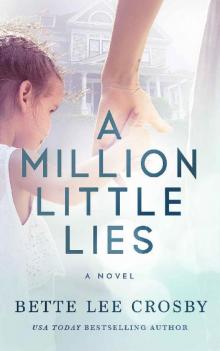 A Million Little Lies
A Million Little Lies Previously Loved Treasures
Previously Loved Treasures The Loft
The Loft Spare Change
Spare Change Memory House: Memory House Collection (Memory House Series Book 1)
Memory House: Memory House Collection (Memory House Series Book 1) Silver Threads
Silver Threads Wishing for Wonderful: The Serendipity Series, Book 3
Wishing for Wonderful: The Serendipity Series, Book 3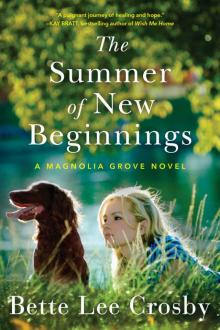 The Summer of New Beginnings: A Magnolia Grove Novel
The Summer of New Beginnings: A Magnolia Grove Novel The Regrets of Cyrus Dodd
The Regrets of Cyrus Dodd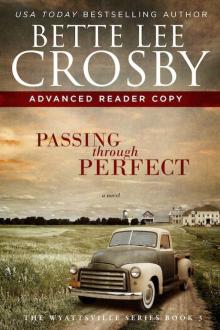 Passing Through Perfect
Passing Through Perfect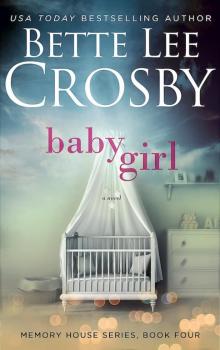 Baby Girl
Baby Girl Jubilee's Journey
Jubilee's Journey Beyond the Carousel
Beyond the Carousel What the Heart Remembers
What the Heart Remembers Cupid's Christmas
Cupid's Christmas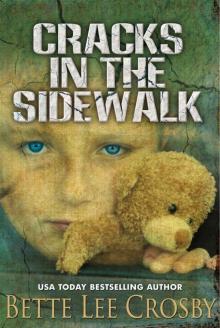 Cracks in the Sidewalk
Cracks in the Sidewalk Blueberry Hill
Blueberry Hill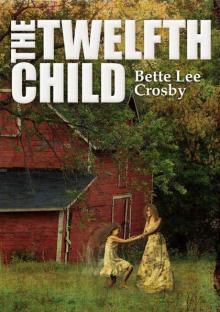 The Twelfth Child
The Twelfth Child A Year of Extraordinary Moments (A Magnolia Grove Novel)
A Year of Extraordinary Moments (A Magnolia Grove Novel)